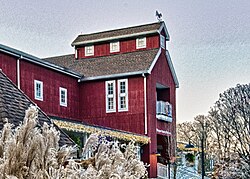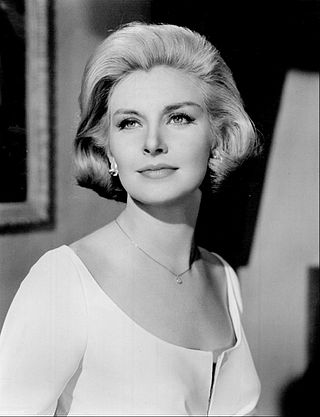
Joanne Gignilliat Trimmier Woodward is an American retired actress. A star since the Golden Age of Hollywood, Woodward made her career breakthrough in the 1950s and earned esteem and respect playing complex women with a characteristic nuance and depth of character. She is one of the first film stars to have an equal presence in television. Her accolades include an Academy Award, three Primetime Emmy Awards, a British Academy Film Award, three Golden Globe Awards, and a Screen Actors Guild Award. She is one of the last surviving stars from the Golden Age of Hollywood cinema and the oldest living Best Actress Oscar-winner.

Westport is a town in Fairfield County, Connecticut, United States, along the Long Island Sound within Connecticut's Gold Coast. It is 48 miles (77 km) northeast of New York City. The town is part of the Western Connecticut Planning Region. Westport's public school system is ranked as the top public school district in Connecticut and 17th best school district in the United States.

In American theater, summer stock theater is a theater that presents stage productions only in the summer. The name combines the season with the tradition of staging shows by a resident company, reusing stock scenery and costumes. Summer stock theaters frequently take advantage of seasonal weather by having their productions outdoors, under tents set up temporarily for their use, or in barns.

Santa Fe Opera (SFO) is an American opera company, located 7 miles (11 km) north of Santa Fe, New Mexico. After creating the Opera Association of New Mexico in 1956, its founding director, John Crosby, oversaw the building of the first opera house on a newly acquired former guest ranch of 199 acres (0.81 km2). The company has presented operas each summer festival season since July 1957, and is internationally known for introducing new operas as well as for its productions of the standard operatic repertoire. Five operas are presented each season during the summer.

The Fox Theatre is a performing arts center located at 2211 Woodward Avenue in Downtown Detroit, Michigan, near the Grand Circus Park Historic District. Opened in 1928 as a flagship movie palace in the Fox Theatres chain, it was at over 5,000 seats the largest theater in the city. Designed by theater architect C. Howard Crane, it was listed on the National Register of Historic Places in 1985.

A fly system, or theatrical rigging system, is a system of ropes, pulleys, counterweights and related devices within a theater that enables a stage crew to fly (hoist) quickly, quietly and safely components such as curtains, lights, scenery, stage effects and, sometimes, people. Systems are typically designed to fly components between clear view of the audience and out of view, into the large space, the fly loft, above the stage.

The Chicago Theatre, originally known as the Balaban and Katz Chicago Theatre, is a landmark theater located on North State Street in the Loop area of Chicago, Illinois. Built in 1921, the Chicago Theatre was the flagship for the Balaban and Katz (B&K) group of theaters run by A. J. Balaban, his brother Barney Balaban and partner Sam Katz. Along with the other B&K theaters, from 1925 to 1945 the Chicago Theatre was a dominant movie theater enterprise. Currently, Madison Square Garden, Inc. owns and operates the Chicago Theatre as a 3600 seat performing arts venue for stage plays, magic shows, comedy, speeches, sporting events and popular music concerts.
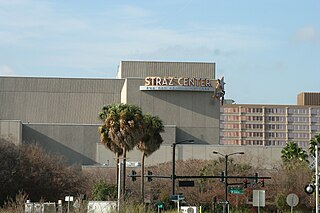
The Straz Center for the Performing Arts is a performing arts venue in Tampa, Florida, United States. It opened in 1987 as the Tampa Bay Performing Arts Center, and was renamed in 2009.
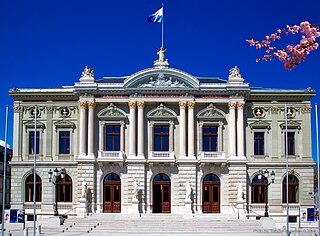
Grand Théâtre de Genève is an opera house in Geneva, Switzerland.
Seattle Rep is a major regional theater located in Seattle, Washington, at the Seattle Center. It is a member of Theatre Puget Sound and Theatre Communications Group. Founded in 1963, it is led by Artistic Director Dámaso Rodríguez and Managing Director Jeffrey Herrmann. It received the 1990 Regional Theatre Tony Award.
Henry T. Weinstein was an American film producer.

Avalon is a historic nightclub in Hollywood, California, located near the intersection of Hollywood and Vine, at 1735 N. Vine Street. It has previously been known as The Hollywood Playhouse, The WPA Federal Theatre, El Capitan Theatre, The Jerry Lewis Theatre, The Hollywood Palace and The Palace. It has a capacity of 1,500, and is located across the street from the Capitol Records Building.
Mark Lamos is an American theatre and opera director, producer and actor. Under his direction, Hartford Stage won the 1989 Tony Award for Outstanding Regional Theatre and he has been nominated for two other Tonys. For more than 15 seasons, he has been artistic director of the Westport Country Playhouse. In May 2023, he announced he will leave the post in January 2024.

The Hanna Theatre is a theater at Playhouse Square in downtown Cleveland, Ohio, United States. It is one of the original five venues built in the district, opening on March 28, 1921. The Hanna Theatre reopened in 2008 as the new home of Great Lakes Theater Festival after a major renovation by the classic theater company.

The American Shakespeare Theatre was a theater company based in Stratford, Connecticut, United States. It was formed in the early 1950s by Lawrence Langner, Lincoln Kirstein, John Percy Burrell, and philanthropist Joseph Verner Reed. The American Shakespeare Festival Theatre was constructed and the program opened on July 12, 1955, with Julius Caesar. The theater building burned to the ground on January 13, 2019.
The Capitol Theatre is a theatre operating in Rome, New York. It opened December 10, 1928 as part of the Kallet chain of movie houses, presenting first run films until it closed in 1974. After extensive renovation, the theatre re-opened in 1985 as the non-profit Capitol Civic Center, offering classic films, live theatrical performances, and concerts.
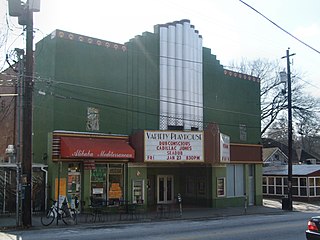
The Variety Playhouse is a music venue in Atlanta, Georgia, United States. It is located on Euclid Avenue and features a variety of music acts including rock, indie, electronic, funk, country, folk, bluegrass, jazz, blues and world music as well as other live shows.
James B. McKenzie was an American theater producer best known for heading the Westport Country Playhouse, the American Conservatory Theater, and the Peninsula Players.

The Ricardo Montalbán Theatre is a theater in the Hollywood section of Los Angeles.

Armina Marshall (1895-1991) was a playwright and actress, and the first co-director of New York's Theatre Guild.
